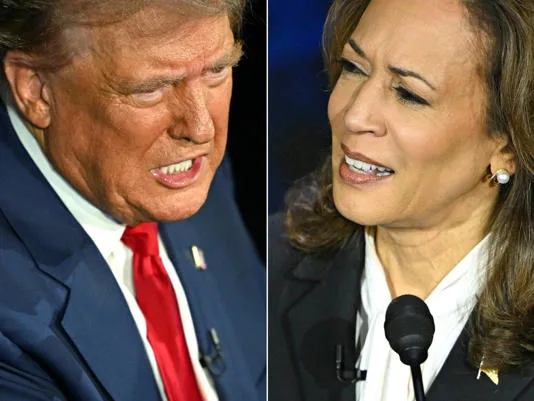The 2024 US presidential election pitting Vice-President Kamala Harris against former president Donald Trump is now less than a month away. Here are some key dates and issues that may affect the timing of the result and transition to a new administration.
Early voting
Do you have questions about the biggest topics and trends from around the world? Get the answers with SCMP Knowledge, our new platform of curated content with explainers, FAQs, analyses and infographics brought to you by our award-winning team.
Forty-seven states, Washington DC, Guam, Puerto Rico and the Virgin Islands offer early in-person voting to all registered voters; some have been doing so since August.
Three states – Alabama, Mississippi and New Hampshire – do not offer early in-person voting, though they may provide these options to eligible absentee voters.
Early in-person voting may begin as early as 50 days ahead of Election Day – Tuesday, November 5 – or as late as Friday, November 1. The average start date for early voting is 27 days before the election.
Although most states have absentee voting, deadlines and rules on who can take part vary. Some states require notification about the reason for an absentee ballot request. In most states, an absentee ballot must be requested in each election, but some allow voters to sign up to have absentee ballots sent to them in each election.
Members of the US military and their immediate relatives, as well as US citizens living outside the country can register to vote and request an absentee ballot by completing a Federal Post Card Application (FCPA) online.
November 5: Election Day
News organisations usually calls the winner because the official determination is done later by the Electoral College (see below). The 2020 result was not called until four days after Election Day because the vote totals were very close in several states, including Georgia.
That made the hand-counting of absentee ballots, a time-consuming process, critical to the outcome.
December 3: Georgia run-off election
This would take place if no candidate in a race received a majority of the vote on Election Day. Georgia is a swing state, possibly making it a factor in deciding the national contest.
A voter picks up a voting sticker during Georgia’s primary election at Morningside Presbyterian Church in Atlanta in May. Donald Trump and Kamala Harris are locked in a tight race to win the battleground state. Photo: Reuters
December 17: Electoral College convocation
The winner of the presidential election is officially chosen through the Electoral College, by “electors” chosen by state political parties. This process has increasingly become an issue for those arguing that the popular vote should be used instead, as is the case with all other down-ballot and subnational contests.
Before the election, each state’s political parties choose slates of potential electors, who cannot be holding national public office, but can be a publicly elected official on the state level. Each state has as many electors as it has members of Congress. Including Washington DC’s three electors, the US has 538 electors.
Voters select their state’s electors by casting their ballots in the election. In effect, a vote for Trump, for example, is actually a vote for the electors selected by the state’s Republican committee.
In 48 states and the nation’s capital, the state party designates its entire slate of electors for the winning candidate to cast their votes for the next president. Maine and Nebraska assign their electors using a proportional system.
A presidential candidate needs the vote of at least 270 electors – more than half of the total 538 electors – to win the White House, even if the popular vote indicates a different winner, as happened most recently in 2016.
January 6, 2025: Congress certifies
On this date, members of both chambers of the US Congress will meet in the Capitol building, in the hall of the House of Representatives, at 1pm, with the president of the Senate or a designee presiding.
In this joint session, the electoral certificates for each state are counted and tallied, and the count is announced by the president of the Senate, a position always held by the sitting US vice-president.
It was on this day in 2021 that Trump supporters attacked the US Capitol in a bid to halt the certification by then vice-president Mike Pence.
In 2022, US President Joe Biden signed legislation changing the arcane law that governs the certification process, seeking to avoid a repeat of Trump’s effort to reverse his defeat in the 2020 election.
The new provisions clarify that the vice-president’s responsibilities in the process are purely ceremonial, and do not include any authority or any say in determining which candidate won the election.
They also raise the threshold required for members of Congress to object to certifying the electors to one-fifth of each chamber. Before, just one member of the House and the Senate, respectively, had to object to force a roll-call vote on an individual state’s electors.
Then-US vice-president Mike Pence and then-House speaker Nancy Pelosi presiding over a joint session of Congress to certify the 2020 Electoral College results late on January 6, 2021, into early January 7, after supporters of Donald Trump had stormed the Capitol. Photo: EPA-EFE
OTHER ISSUES
Election denialism
Trump has made election denialism central to his campaign strategy, falsely claiming since he lost the 2020 election that voting irregularities handed Biden the victory.
This is despite assurances from his own departments of Justice and Homeland Security that no serious fraud transpired.
His efforts to overturn the election results are at the centre of two lawsuits that Trump is fighting, one in US federal court and another in Georgia.
Still, many in Trump’s base of support say they believe the claim, leading to threats of violence against poll workers and expectations that the former president and his allies would file a slew of lawsuits contesting the results if Harris wins the Electoral College vote. That could delay the convocation that is supposed to take place in mid-December.
New rules in Georgia
Trump-backed members of the state’s election board recently passed controversial rules that could allow local election boards responsible for certifying results to conduct investigations that threaten to delay certification.
Republicans have argued the rules are necessary to maintain the integrity of the election process.
Differences in how US states process their ballots virtually ensures that the next American president will not be known on November 5. Photo: Fresno Bee/TNS
Democrats counter that allowing election superintendents to withhold certification based on vague suspicions could create confusion and that widespread recounts could undermine the integrity to an even greater extent.
Democrats have sued the election board, seeking to strike down the new rules. Judge Robert McBurney of the Superior Court of Fulton County, Georgia, appears unlikely to toss out the “reasonable inquiry” rule, but last week said “on its face, [the rule] is vague and needs clarification”.
Georgia state law requires county election boards to certify results one week after election day.
The Georgia State Election Board also passed a new law last month requiring that the number of ballots – not the number of votes – be counted by hand at each polling place by three separate poll workers until all three counts match.
No early tabulation in Pennsylvania and Wisconsin
While many US states have changed their rules to speed up the vote count in the four years since the 2020 election, political gridlock in the key battleground states of Pennsylvania and Wisconsin has blocked changes that would have allowed poll workers to begin opening and processing mail-in ballots before election day.
This will make it all but impossible for a reliable call on who the winner is on the night of the election.
Election experts caution that it could be multiple days before the presidential race is called, and are trying to prepare the public for a “red mirage” followed by a “blue wave”.
That refers to early tallies likely to favour the Republicans, giving way to a shift towards a Harris win as absentee ballots, cast largely by Democrats, are counted.





